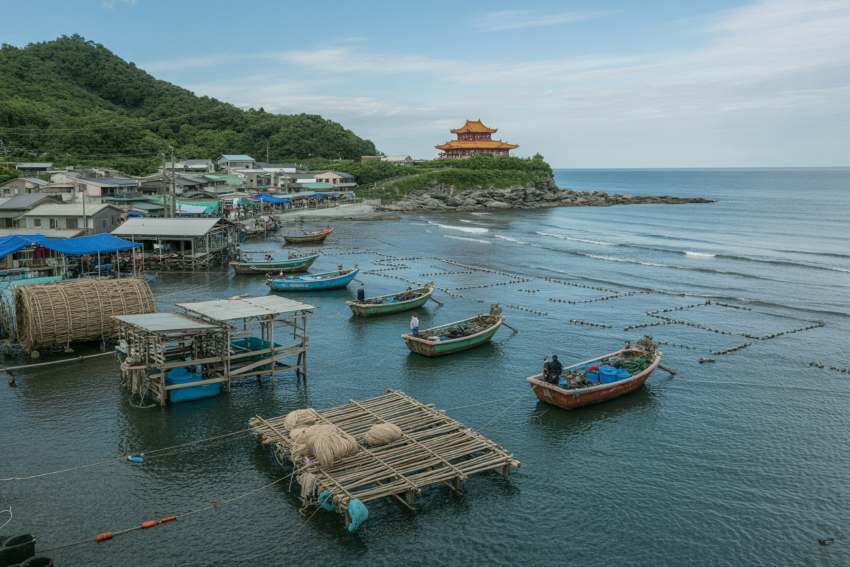Published on
October 20, 2025

Some of Taiwan’s most intriguing cultural, geological, and environmental landscapes can be found in the Northeast and Yilan Coast National Scenic Area. The Tourism Administration of Taiwan recently organised a two-day eco-tour that took participants through the area’s natural beauty while emphasizing local fishing customs, sustainable practices, and the urgent need for marine conservation.
The eco-tour, which ran from Yilan’s Toucheng Township to New Taipei City’s Ruifang District, was designed to introduce tourists to Taiwan’s distinctive coastal landscape and lively fishing village culture. The programme included a variety of historical analysis, traditional handicrafts, and practical exercises that gave visitors a chance to interact with the local way of life and discover the area’s dedication to sustainability.
A Journey Through Taiwan’s Fishing Villages
The tour began with visits to traditional fishing ports, where participants were introduced to the distinctive fishing techniques that have been a vital part of the region’s economy for centuries. The port visits provided a deep dive into the various methods of fishing that continue to be used in the area, including single-hook fishing, long-line fishing, and stationary nets placed near the shore. These methods, alongside the less common seafloor dragging nets, were discussed, with an emphasis on their environmental impacts and the challenges that arise from modern fishing practices.
The hands-on experience of the tour allowed visitors to gain a tangible understanding of these techniques. Visitors could witness firsthand how fish were caught and prepared, gaining an appreciation for the connection between these traditional practices and the surrounding environment. The administration’s press release emphasised the region’s dedication to preserving these methods as part of its cultural and environmental heritage.
Marine Conservation and Sustainable Practices
An essential element of the eco-tour was the focus on sustainability and marine conservation. One of the activities featured a marine waste recycling program, which demonstrated how discarded materials collected from the beaches and seas could be repurposed for new uses. Participants were also introduced to the process of creating preserved flower crafts from marine waste, an initiative led by a local beach-cleaning advocate.
The importance of these activities was highlighted by the growing concerns over pollution in Taiwan’s seas and oceans. Through educational experiences like these, the tour sought to increase awareness of the impact that human activity has on marine ecosystems and the necessity of responsible waste management and recycling practices.
The demonstration of repurposing marine waste into useful crafts was not only an educational experience but also an empowering activity for those involved. It illustrated how waste can be transformed into something both beautiful and functional, supporting Taiwan’s push towards a more sustainable future for its coastal communities.
Yilan’s Heritage and Cultural Preservation
The tour took participants to several other locations along the coast, each offering a unique insight into the region’s history and cultural significance. One such stop was Dali Harbour in Toucheng Township, famous for its traditional old street and the Tiangong Taoist temple. This historic area, known for its tranquil atmosphere and old-world charm, provided visitors with a glimpse into the daily lives of the people who have inhabited this region for generations.
Another highlight of the tour was a visit to “Dali 63”, a venue run by graduate students from National Yilan University. Here, visitors were introduced to local crafts and traditional toys that showcase the area’s cultural richness. This venue plays an important role in the ongoing efforts to preserve Yilan’s heritage, as it combines education with active participation in the region’s cultural conservation efforts.
Learning Traditional Crafts and Fishing Tools
A significant part of the tour involved engaging with the traditional crafts that have been passed down through generations. One of the unique experiences offered was the chance to learn how to make ropes for fishing tools using shell flowers, a hardy, water-resistant plant fibre that has been used by locals for centuries. Participants were shown the process of crafting these ropes, which are integral to traditional fishing tools in the region.
This hands-on activity not only provided participants with a deeper understanding of the craftsmanship involved but also highlighted the importance of preserving these techniques in the face of modern technology. The skill required to make these ropes by hand was an eye-opening experience for many, and it underscored the connection between sustainable practices and traditional methods.
Preserving the Region’s Natural and Cultural Heritage
The eco-tour served as both an educational opportunity and a call to action for visitors to take part in preserving the natural and cultural heritage of Taiwan’s Northeast and Yilan Coast. By participating in activities like marine waste recycling, handmade fish ball workshops, and rope weaving, visitors were able to engage directly with local traditions and sustainability efforts. The tour emphasised the importance of both protecting the environment and preserving the unique cultural practices that have been a part of this region for centuries.
Through these experiences, the Tourism Administration aims to promote ecotourism in Taiwan and raise awareness about the environmental challenges the region faces. The eco-tour was a reminder of how tourism can be used as a vehicle for change, fostering a deeper appreciation for both cultural heritage and sustainable practices.
Conclusion
Taiwan’s Northeast and Yilan Coast eco-tour offers visitors a fantastic chance to experience one of the island’s most ecologically and culturally significant areas. The tour gives tourists an opportunity to experience Taiwan in a way that supports and conserves its natural and cultural heritage by emphasizing sustainable activities, traditional fishing methods, and cultural preservation. Taiwan provides other travel destinations with a model for striking a balance between the necessity of tourism and the significance of sustainability and cultural preservation as it continues to embrace eco-tourism.
With this eco-tour, visitors can experience an unforgettable journey into the heart of Taiwan’s coastal heritage while immersing themselves in the local way of life and engaging in meaningful activities that support environmental conservation.
link

